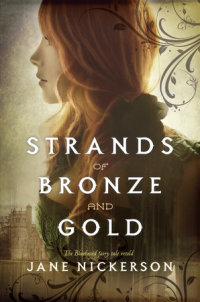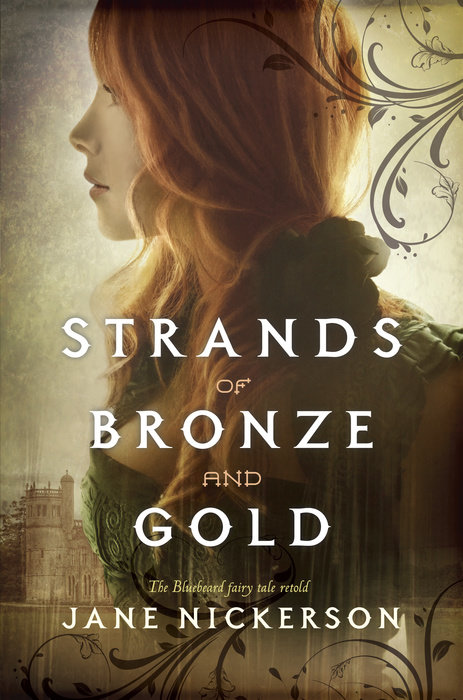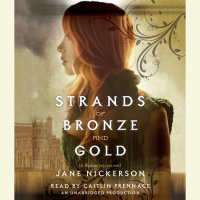Strands of Bronze and Gold
The Bluebeard fairy tale retold. . . .
When seventeen-year-old Sophia Petheram’s beloved father dies, she receives an unexpected letter. An invitation—on fine ivory paper, in bold black handwriting—from the mysterious Monsieur Bernard de Cressac, her godfather. With no money and fewer options, Sophie accepts, leaving her humble childhood home for the astonishingly lavish Wyndriven Abbey, in the heart of Mississippi.
Sophie has always longed for a comfortable life, and she finds herself both attracted to and shocked by the charm and easy manners of her overgenerous guardian. But as she begins to piece together the mystery of his past, it’s as if, thread by thread, a silken net is tightening around her. And as she gathers stories and catches whispers of his former wives—all with hair as red as her own—in the forgotten corners of the abbey, Sophie knows she’s trapped in the passion and danger of de Cressac’s intoxicating world.
Glowing strands of romance, mystery, and suspense are woven into this breathtaking debut—a thrilling retelling of the “Bluebeard” fairy tale.
An Excerpt fromStrands of Bronze and Gold
Chapter 1
The Fairy Tale Begins
You see, I had a fabulously wealthy godfather. That was why anything was possible for me.
I couldn’t remember a time when thoughts of him didn’t send a silvery little thrill through my body. He was a mystery and a magician and all my family’s hopes for the future rolled into one. Soon, when the carriage covered the last miles of our journey, I would meet him at last--my godfather and guardian, Monsieur Bernard de Cressac.
And his wife, of course, but I tended to forget about her.
The wildwood we had plunged into might easily have been the setting for the thief’s lair in “The Robber Bridegroom,” so tangled and murky and haunted it seemed. However--I smashed a mosquito against my neck and my own blood spurted out--fairy-tale forests would never have been this itchy or this sweltering. Perspiration dripped off my nose before my handkerchief could catch it. Inside my bonnet my curls were plastered to my head.
My godfather had referred to my hair as “bronze” in one of his letters when I was younger--a letter featuring a delightfully spun story about a princess with tresses the shade of my own, strands of bronze and gold. . . .
M. de Cressac’s last letter lay in my lap, its ivory paper limp from much handling. As always, at sight of the bold black handwriting, my chest tightened. A few months earlier, while my family had been going about the sad business of mourning the death of our father, M. de Cressac had been thinking of me, had been penning this invitation to his home, Wyndriven Abbey. Telling me he could not return to his “solemn duties” until he had asked me to come to him so I might “sweeten the atmosphere of an old man’s dwelling” with my “companionship, youth, and beauty.”
My brother Harry had snorted at that last part.
In that letter M. de Cressac called himself an old man. This conflicted with the image I had always held of the saint, soldier, explorer. The adventurer I had fantasized about had been old, of course, since he was a friend of my father’s--forty at least--but muscular and hearty. Well, shortly I would know everything. Shortly my godfather would take his place in my life as a real, solid person, rather than a misty figure of daydreams.
On and on we twisted and snaked beneath arched branches in dim green leaf light, swallowed whole by trees. My eyes grew tired of the sporadic, flickering patches of pale sunshine. It was getting late, but evidently in Mississippi, summer heat didn’t fade with the day.
Surely we’d get there soon.
I pulled down my bonnet’s crinkly mourning crape veil and shoved down my long, tight sleeves just as the trees thinned. We rounded a curve--and there it stood.
The magnificence of the building whooshed at me like a blast of icy wind. Wyndriven Abbey loomed in the center of spreading lawns and gardens and terraces as though it had stood in that spot for centuries. The drive widened as it approached the great edifice, which seemed more of a town than a house. It was toothed with crenellations and spiky with pinnacles and spires and turrets, the setting sun rosily staining the stone and lighting fires in a myriad of mullioned windows.
It was ridiculously vast and grim and terrifying. I loved it already.
As we drove down a gravel driveway edged with dark cedars, though, we passed an eyesore--an ancient, gnarled oak thrust among the cedars, pressing close overhead. It was shrouded with poison ivy (leaves of three, let them be!) and diseased with great misshapen nodules bulging on the trunk. A flock of crows burst out of the branches in a cacophony of cawing and beating wings.
It was not an ill omen.
The carriage pulled into a courtyard, and the very tall footman jumped down to help me alight. The coachman and the footman were both Africans, but they seemed elegantly European in their coats of resplendent sapphire velvet.
Surely I wasn’t actually shrinking as I climbed stone steps to massive, iron-shod doors. As per habit, I pinched my cheeks and bit my lips to bring on more color, forgetting that I was probably already flushed from the heat. The de Cressacs must be pleased with my appearance, or at least not appalled.
I tugged at the rope of an iron bell. The echoes of its clanging still sounded when the door was answered by another very young, very tall footman.
“I am Miss Sophia Petheram,” I said in a tight little voice, “come to stay with the de Cressac family.”
“Yes,” the footman said, opening the door wider and gesturing with a flourish for me to enter. “You’re expected, Miss.”
He spoke formally, but I must have looked frightened because he flashed a reassuring grin. He was young enough that he had not yet learned to be perfectly impassive.
In the lofty hall, whose arched and vaulted ceiling disappeared into shadows, candles already glittered in sconces and an immense candelabra blazed away on a center table. Beeswax tapers, they must be, from the clear, clean light. Of course gaslight would not yet have reached this place, so deep in the wilds. An expanse of black-and-white marble led to the grand staircase, wide and splendidly balustraded, seemingly hung in space. In the gloom the brilliant trompe l’œil decorations painted on the wall behind deceived me for a moment into thinking the staircase was a mere painting as well.
The footman’s eyes went past my shoulder. “Mr. Ling, the butler, will take you to the master.”
Outwardly I barely flinched when a figure glided forward from the wall just behind me.
“I hope I did not startle you,” said a deep, quiet voice.
My chest still thudded. Yes, definitely startled.
Mr. Ling was a Chinese man, the first I had ever met, wrinkled like a walnut shell and with a long gray beard, wearing a high-collared black brocade tunic and skirt. Something to tell my siblings. His eyes were incredibly weary. He bowed. I flipped back my veil and curtsied, not caring that one probably shouldn’t curtsy to servants. He was so very old, and his eyes . . .
“Come this way, Miss Petheram,” he said. He spoke excellent English. He led me through a long gallery with adjoining anterooms and salons. It was a kaleidoscope of dazzling opulence--gold leaf and stamped leather, rich tapestries and ornate paintings. Only I was out of place.
I fingered the hair brooch at my throat--brown strands from my father and coppery strands from my mother--plaited by my sister Anne into a heart shape.
On the journey I had whiled away the moments, hours, days by designing dresses in my mind. It was a weakness of mine that often I’d get so enmeshed in my musings I would forget reality. In my imaginary meeting with M. de Cressac, I had worn a gown of emerald green silk with jet beads embroidered in the skirt that clicked as I walked. I could hear it. I could feel it--the weight of the beads. I looked down. Surprise! Still ugly black bombazine. Never had I imagined I would meet my guardian swathed in a fabric so dark and dull it swallowed the light of every room.
By the time Mr. Ling threw back double doors, announcing my name, my mouth was dry as cotton and my hands sticky as they clutched my reticule.
My godfather rose from a chair, and we stood looking at each other. Everything in me seemed to spiral. This person standing before me was the most handsome man I had ever laid eyes upon.
His hair and beard were black with a few silver threads that gave them almost a bluish cast. His features were finely chiseled, with laugh lines around the eyes. To my delight (and dismay), he sported small silver hoops in his ears, like a pirate. I had always adored pirates. Tall and powerfully built, his buff linen coat fit his figure superbly and he carried himself with the natural grace of an athlete as he strode toward me.
I curtsied and he bowed slightly.
He took my small hands in his large ones and looked down into my face without speaking. His eyes were the color of honey.
Time to launch into the words I had prepared. “I am pleased to meet you at last, sir. You are most kind to let me come and live in your beautiful home.”
“Enchante, Mademoiselle.” His tone was grave, but amusement flashed across his features at my polite little speech. He held my hand to his lips and kissed it, still watching my face.
“My--my family sends their good wishes and compliments.”
M. de Cressac laughed outright now. “Do they indeed? After I have stolen away their sister? My little Sophia, at last you come to me. Let me see you better.” He pushed back my bonnet so it hung by its ribbons from my neck.
I looked him bravely in the eye without blinking as he studied me.
“Oui,” he said softly. “Yes.” His hand smoothed my damp, rumpled hair. “Do you know--no, how could you?--that the one time I saw you, you were a babe in your dear mother’s arms. She was ill, and died soon after, but still a beauty. She had a certain fey quality, as though she were not quite of this world, and I suspected you would look just like her when you were grown.”
The story was that as a scrawny, squalling infant, red of face and hair (my brother Harry’s description), I had enchanted M. de Cressac, although no one could imagine why. It must have been my mother who did the enchanting.
“And--and is Madame de Cressac at home?” I asked.
“I am, alas, a widower.”
A widower. My father had said Madame de Cressac was a French lady. A lovely French lady. “I didn’t know--I’m so sorry. Papa should . . . he should have told us.”
“He probably did not know. I am afraid I did not communicate with Martin much these last years.”
As my godfather spoke, an elderly woman with an unfortunate nose and an immense silver tray shuffled into the room, a chatelaine jingling from her waist. She paused, regarding me with an anxious scrutiny.
“Ah,” M. de Cressac said, taking the tray from her hands, “Mrs. Duckworth, allow me to present my goddaughter, Sophia Petheram. Sophia, Mrs. Duckworth is the housekeeper here and worth her weight in gold.”
The lady beamed first at M. de Cressac and then at me. Her eyes nearly squinted shut. Her skin was doughy, with large pores. “You’re very welcome, I’m sure.” She had a British accent and her voice was pitched unusually high.
“Mrs. Duckworth’s greatest pleasure is looking after people,” M. de Cressac said. “If there is anything you should want, let her know, and she will see to it that you get it. Unless, of course, I notice and give it to you first.” He winked at me. “Be assured we intend to spoil you.”
“That we do.” The housekeeper nodded so enthusiastically that the gold brooch on her ample bosom bobbed. “Now, Miss, sit you down and have a nice glass of cold lemonade and some refreshment, and then I will show you to your room.”
“I will accompany you both,” M. de Cressac said. “I want to see Sophia’s face when she first sets eyes on her bedchamber.”
My last qualms were put to flight by this reception. Obviously Mrs. Duckworth was respectability itself, even if there was no longer a Madame de Cressac in the household.
The tea tray was mounded with lemon tarts, maids of honor, jam cake with burnt sugar glaze, coconut cake with divinity icing, cream buns, and cheesecakes. I sipped lemonade (mint was sprinkled on it, making it taste like grass, only in a pleasing way) and nibbled a cream bun, trying not to let cream ooze everywhere, while my godfather inquired about my journey.
“Your carriage was wonderful,” I said, swallowing quickly. “I’ve never been in one as well sprung. I could sink back into the cushions and rest and even read without the swaying and bumping making me ill. And all the blooming magnolia trees in the town are lovely. So Southern-looking.”
“Yes, Chicataw, Mississippi, is indeed ‘Southern-looking.’ ”
“People nearly fell out of their windows staring as we drove by. They must have recognized your crest on the door.”
“Naturally they are eaten up with curiosity. Although I have been here twenty-five years, I am still the strange foreigner. We have few dealings in the town.” He noticed me dab my forehead with my handkerchief. “When first I came to the South, the heat was oppressive, but I am used to it now.”
“I’ll become used to it too,” I said. “You should have seen the suspicious character I rode with in the coach on the way to Memphis. As we drove, I thought up all sorts of stories explaining him. He wore a great coat and a hat pulled down over his ears. While the rest of us shoved up our sleeves and fanned ourselves with everything we could lay our hands on--newspapers and handkerchiefs and, of course, real fans if we could find ours--and took off anything we were allowed to take off, he only unfastened the top button of his coat. First his collar wilted, then his tie went crooked, and then he simply gave up and leaned back and slept, snoring. The sweat pooled in his ears and a fly crawled across his nose. It was dreadful to behold a human being melt before my very eyes.”
“Certainly it would be disturbing,” my godfather said. “Dear me, what dangerous and grueling adventures you have been through! And yet you appear charmingly unscathed.”
He told about his estate. His voice melted around me like warm chocolate. He had just enough French accent to add to his charm. “The main house was a real English abbey. One that housed medieval monks and nuns. Are you disappointed it is not a new house? That it is so . . . well used?”
“Oh, no! I love antique places, and this one is amazing. I used to pass the old section in Boston and feel envious. There was one house in particular that dated from the mid-1600s and it--it was intriguing.” I compressed my lips to keep from launching into a long story. M. de Cressac had an odd and contradictory effect on me. I had never been a chatterbox, but the way he watched me, as if fascinated, stimulated me to keep talking on and on. However, it was not because he made me comfortable; indeed, a certain tension quivered in the air, and I sat bolt upright on the edge of my chair.


